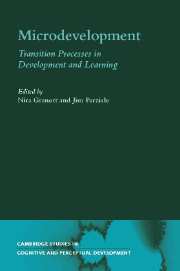Book contents
- Frontmatter
- Contents
- List of figures
- List of tables
- List of contributors
- Microdevelopment: A process-oriented perspective for studying development and learning
- Part I Variability
- 1 Microgenetic studies of self-explanation
- 2 Microdevelopment and dynamic systems: Applications to infant motor development
- 3 Looking at the hands through time: A microgenetic perspective on learning and instruction
- Part II Transition mechanisms
- Part III Micro- and macrodevelopment
- Part IV Context
- Author index
- Subject index
- References
1 - Microgenetic studies of self-explanation
Published online by Cambridge University Press: 22 September 2009
- Frontmatter
- Contents
- List of figures
- List of tables
- List of contributors
- Microdevelopment: A process-oriented perspective for studying development and learning
- Part I Variability
- 1 Microgenetic studies of self-explanation
- 2 Microdevelopment and dynamic systems: Applications to infant motor development
- 3 Looking at the hands through time: A microgenetic perspective on learning and instruction
- Part II Transition mechanisms
- Part III Micro- and macrodevelopment
- Part IV Context
- Author index
- Subject index
- References
Summary
Microgenetic methods are useful for many purposes. They can yield more precise descriptions of cognitive change than would otherwise be possible, can reveal both similarities and dissimilarities in change processes across tasks and age groups, and can provide the type of detailed data that are essential for constructing formal models of cognitive change. Further, as is amply demonstrated in this volume, they are useful for examining change involving a wide variety of tasks and age groups and for addressing a wide variety of theoretical issues.
In the present chapter, I pursue two main goals, one quite general and one relatively specific. The more general goal is to describe a theory of cognitive change – the overlapping waves approach – that has arisen from my own and other investigators' microgenetic studies. The more specific goal is to illustrate a use to which the microgenetic method is just beginning to be put, but one that it can serve very effectively: Helping us understand how instructional approaches exercise their effects. The particular instructional approach used to illustrate this function is encouragement to generate self-explanations, that is, encouragement to explain how or why events occurred. I first describe the general theory, then the specific application.
Overlapping waves theory
Implicit metaphors shape our thinking about many topics. A common implicit metaphor underlying traditional views of cognitive development was made explicit by the title of Robbie Case's (1992) book The mind's staircase.
- Type
- Chapter
- Information
- MicrodevelopmentTransition Processes in Development and Learning, pp. 31 - 58Publisher: Cambridge University PressPrint publication year: 2002
References
- 142
- Cited by

